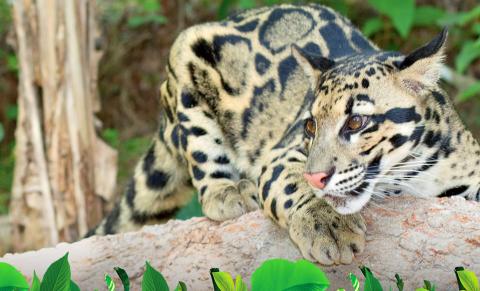Despite an alleged sighting last year by Aboriginal hunters, Taiwan’s Formosan clouded leopard has been officially deemed extinct in the wild since 2013.
Next weekend, a talk and a guided tour about the animal will be taking place as part of the exhibit Transcultural Forests of Taiwan: Lrikulau or the clouded Leopard, at Huashan 1914 Creative Park. Lrikulau is the name given to the big cat by the Aboriginal Rukai people, who considered hunting it a taboo.
The talk will take place on Sept. 21, with the topic revolving around the future conservation of the clouded leopard. It will feature renowned zoologist and conservation researcher Chiang Po-jen (姜博仁) and two Rukai cultural workers, moderated by Scientific American deputy editor-in-chief Marine Chang (張孟媛). The talk will be in Chinese only.

Photo courtesy of Future for Clouded Leopard
The tour is in English and will introduce Taiwan’s forest history and culture, indigenous forest etiquette, the wildlife of Taiwan and ecological research on a variety of local fauna, including the leopard cat and sambar deer.
■ The talk is at 2pm at the exhibition space at Huashan 1914 Creative Park, 1, Bade Road, Sec 1, Taipei City (台北市八德路一段1號). Visit the following link to register:www.ylib.com/action/signup.asp?actNo=1248
■ The guided tour will take place at 11am, 1pm and 3pm at the exhibition space (by appointment only). To register, go to: docs.google.com/forms/d/e/1FAIpQLSfhIfGPdWBiFIINOtuptWtIhLEgBNK1SuqlhwJKER5D2t1_Ig/viewform
■ The exhibition runs through Sept. 28.

June 2 to June 8 Taiwan’s woodcutters believe that if they see even one speck of red in their cooked rice, no matter how small, an accident is going to happen. Peng Chin-tian (彭錦田) swears that this has proven to be true at every stop during his decades-long career in the logging industry. Along with mining, timber harvesting was once considered the most dangerous profession in Taiwan. Not only were mishaps common during all stages of processing, it was difficult to transport the injured to get medical treatment. Many died during the arduous journey. Peng recounts some of his accidents in

“Why does Taiwan identity decline?”a group of researchers lead by University of Nevada political scientist Austin Wang (王宏恩) asked in a recent paper. After all, it is not difficult to explain the rise in Taiwanese identity after the early 1990s. But no model predicted its decline during the 2016-2018 period, they say. After testing various alternative explanations, Wang et al argue that the fall-off in Taiwanese identity during that period is related to voter hedging based on the performance of the Democratic Progressive Party (DPP). Since the DPP is perceived as the guardian of Taiwan identity, when it performs well,

The Taiwan People’s Party (TPP) on May 18 held a rally in Taichung to mark the anniversary of President William Lai’s (賴清德) inauguration on May 20. The title of the rally could be loosely translated to “May 18 recall fraudulent goods” (518退貨ㄌㄨㄚˋ!). Unlike in English, where the terms are the same, “recall” (退貨) in this context refers to product recalls due to damaged, defective or fraudulent merchandise, not the political recalls (罷免) currently dominating the headlines. I attended the rally to determine if the impression was correct that the TPP under party Chairman Huang Kuo-Chang (黃國昌) had little of a

At Computex 2025, Nvidia CEO Jensen Huang (黃仁勳) urged the government to subsidize AI. “All schools in Taiwan must integrate AI into their curricula,” he declared. A few months earlier, he said, “If I were a student today, I’d immediately start using tools like ChatGPT, Gemini Pro and Grok to learn, write and accelerate my thinking.” Huang sees the AI-bullet train leaving the station. And as one of its drivers, he’s worried about youth not getting on board — bad for their careers, and bad for his workforce. As a semiconductor supply-chain powerhouse and AI hub wannabe, Taiwan is seeing